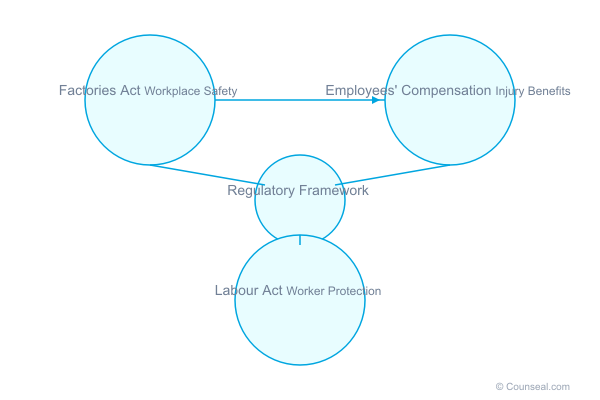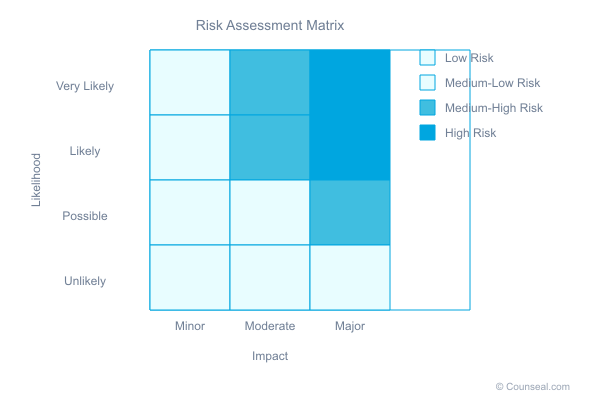Health and Safety Compliance for Nigerian Businesses: A Comprehensive Guide

by Counseal Team
Updated January 24, 2025

The Nigerian business landscape presents unique challenges and opportunities in health and safety compliance. According to the International Labor Organization, workplace accidents cost African economies approximately 4% of GDP annually. For Nigerian businesses, effective compliance isn’t merely about avoiding penalties—it’s about creating sustainable growth through safe, productive workplaces.
Understanding Health and Safety Compliance in Nigeria
The Nigerian business landscape presents unique challenges and opportunities in health and safety compliance. According to the International Labor Organization, workplace accidents cost African economies approximately 4% of GDP annually. For Nigerian businesses, effective compliance isn’t merely about avoiding penalties—it’s about creating sustainable growth through safe, productive workplaces.
Key Regulatory Framework
The Nigerian health and safety regulatory framework comprises three primary pieces of legislation:
- Factories Act: Governs workplace safety standards and equipment maintenance
- Employees’ Compensation Act: Manages workplace injury compensation
- Nigerian Labour Act: Oversees employment conditions and worker protection

Regulatory Bodies and Their Roles
Federal Ministry of Labour and Employment
- Enforces labour laws and regulations
- Mediates employer-employee disputes
- Develops employment policies
- Oversees vocational training programmes
National Industrial Safety Council of Nigeria (NISCN)
- Promotes occupational safety standards
- Provides industry-specific safety guidelines
- Conducts safety training and certification
- Monitors workplace safety compliance
Standards Organisation of Nigeria (SON)
- Develops and enforces quality standards
- Issues product safety certifications
- Monitors compliance with international standards
- Conducts quality assurance inspections
Implementing Compliance Measures
Risk Assessment Framework
- Hazard Identification
- Physical hazards (machinery, electricity)
- Chemical hazards (toxic substances, fumes)
- Biological hazards (pathogens, allergens)
- Ergonomic hazards (repetitive motions, poor posture)
- Risk Evaluation
- Likelihood assessment
- Impact analysis
- Risk prioritisation matrix

Essential Safety Policies and Procedures
Policy Development
- Clear safety objectives
- Role responsibilities
- Implementation timeline
- Performance metrics
Standard Operating Procedures (SOPs)
- Emergency response protocols
- Equipment operation guidelines
- Maintenance schedules
- Incident reporting procedures
Industry-Specific Requirements
Manufacturing Sector
- Machine guarding requirements
- Chemical handling protocols
- Noise control measures
- Personal Protective Equipment (PPE) standards
Construction Industry
- Fall protection systems
- Scaffold safety requirements
- Site security protocols
- Equipment inspection schedules
Oil and Gas Sector
- Emergency response plans
- Environmental protection measures
- Health monitoring protocols
- Safety certification requirements
Best Practices and Implementation
Training and Education
- Regular safety workshops
- Emergency response drills
- First aid certification
- Equipment operation training
Documentation and Monitoring
- Incident reports
- Training records
- Equipment maintenance logs
- Safety audit results
Technology Integration
- Digital compliance tracking
- Real-time monitoring systems
- Online training platforms
- Emergency alert systems
[Learn more about implementing these measures at counseal.com/start]
Conclusion
Effective health and safety compliance requires ongoing commitment and systematic implementation. By following these guidelines and staying current with regulatory requirements, Nigerian businesses can create safer workplaces while enhancing operational efficiency and sustainability. This guide is regularly updated to reflect current Nigerian health and safety regulations. For the latest updates and professional compliance assistance, visit counseal.com.





